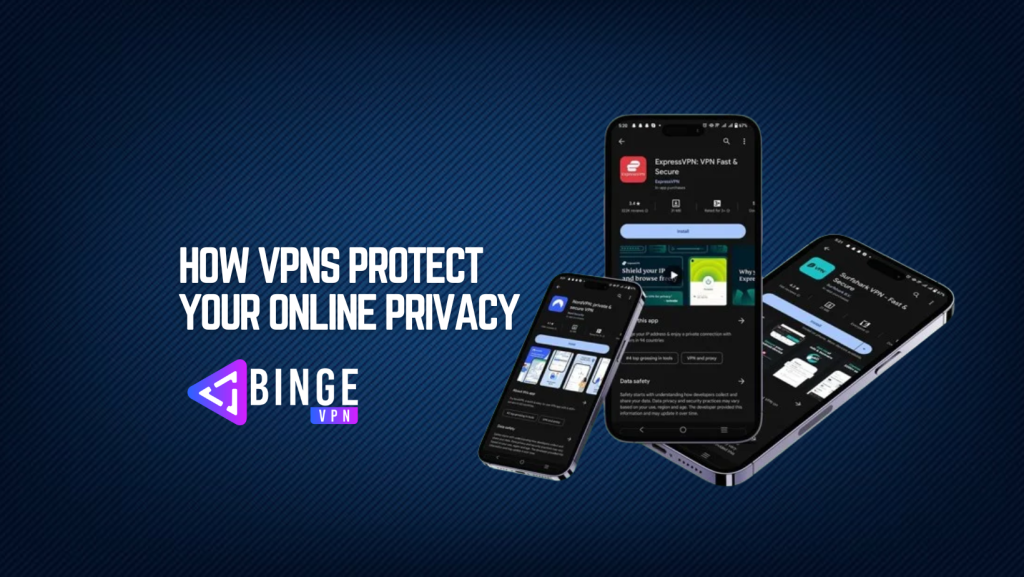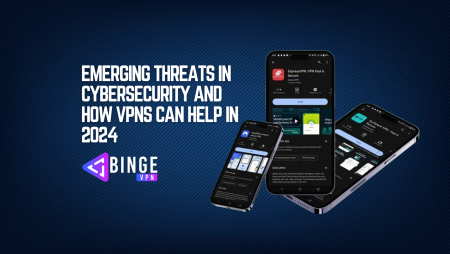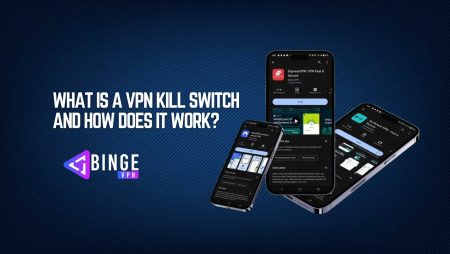In today’s digital age, online privacy has become a significant concern for internet users worldwide. As we continue to rely on the Internet for our daily activities, including shopping, banking, communicating, and entertainment, our personal information is increasingly at risk of being exposed or exploited by cybercriminals, advertisers, and even governments. This is where Virtual Private Networks (VPNs) come into play. A VPN is a powerful tool that can help safeguard your online privacy, providing a secure and private connection over the internet. In this blog, we will explore how VPNs protect your online privacy, why you should consider using one, and what features to look for when choosing a VPN.
Understanding What a VPN Is
A VPN, or Virtual Private Network, is a service that creates a secure and encrypted connection between your device and a remote server operated by the VPN provider. This secure tunnel ensures that your internet traffic is hidden from prying eyes, protecting your data from being intercepted or monitored by hackers, internet service providers (ISPs), or even government surveillance. By masking your IP address and rerouting your traffic through a server in a different location, a VPN makes it appear as though you are browsing from that location, thus providing an additional layer of anonymity.
How VPNs Protect Your Online Privacy
1. Encrypting Your Internet Traffic
One of the primary ways VPNs protect your online privacy is through encryption. When you connect to the internet through a VPN, your data is encrypted using advanced encryption protocols such as AES-256, which is considered the industry standard for security. This encryption scrambles your data into an unreadable format, making it nearly impossible for anyone to intercept or decipher your information without the encryption key. This is particularly important when using public Wi-Fi networks, which are often unsecured and vulnerable to cyberattacks.
2. Hiding Your IP Address
Your IP address is a unique identifier assigned to your device when you connect to the internet. It reveals your general location and can be used to track your online activities. A VPN masks your real IP address by replacing it with the IP address of the VPN server you are connected to. This not only helps to anonymize your online presence but also makes it difficult for websites, advertisers, and other third parties to track your browsing habits or target you with personalized ads.
3. Preventing ISP Tracking
Internet service providers (ISPs) have the ability to monitor your online activities, including the websites you visit, the content you download, and the amount of time you spend online. This information can be used for various purposes, such as creating user profiles for targeted advertising or even selling your data to third parties. In some countries, ISPs are required to store your browsing history and share it with government agencies upon request. By using a VPN, you can prevent your ISP from tracking your online activities, as all your internet traffic is routed through the VPN server and encrypted, making it invisible to your ISP.
4. Protecting Against Cyber Threats
Cybercriminals are constantly devising new ways to exploit vulnerabilities and gain unauthorized access to personal information. A VPN adds an extra layer of security by encrypting your data, which makes it much harder for hackers to intercept your communications or steal your sensitive information, such as passwords, credit card details, or personal messages. Additionally, some VPNs offer built-in security features like malware protection, ad blockers, and firewalls to further safeguard your devices from cyber threats.
5. Bypassing Censorship and Surveillance
In many countries, internet censorship and government surveillance are prevalent, restricting access to certain websites and monitoring users’ online activities. A VPN can help bypass these restrictions by allowing you to connect to servers in other countries, giving you access to the internet as if you were browsing from a different location. This can be particularly useful for accessing blocked content, such as news websites, social media platforms, or streaming services that are restricted in your region. By using a VPN, you can maintain your online privacy and access the information you need without fear of censorship or surveillance.
6. Enhancing Privacy on Public Wi-Fi
Public Wi-Fi networks, such as those found in cafes, airports, and hotels, are convenient but often lack proper security measures, making them prime targets for cybercriminals. When you connect to a public Wi-Fi network without a VPN, your data is vulnerable to interception through techniques like man-in-the-middle attacks. A VPN encrypts your connection, ensuring that your personal information, such as login credentials and financial transactions, remains secure even on unsecured networks.
7. Preventing Browser Fingerprinting
Browser fingerprinting is a technique used by websites and advertisers to track users based on their unique device and browser settings, such as screen resolution, operating system, and installed plugins. This method allows companies to build a profile of your online behavior even if your IP address is hidden. Some advanced VPNs offer features that help prevent browser fingerprinting by masking your device’s characteristics, making it more difficult for trackers to identify and follow you across the web.
8. Protecting Your Search Privacy
Search engines like Google collect vast amounts of data about your search queries and browsing habits, which can be used to personalize search results and target you with ads. A VPN can help protect your search privacy by hiding your IP address and encrypting your search queries, preventing search engines from linking your searches to your identity. Additionally, using a VPN in conjunction with privacy-focused search engines like DuckDuckGo can further enhance your online anonymity.
9. Avoiding Price Discrimination
Some online retailers and booking platforms use your location data to adjust prices, a practice known as price discrimination. This means that the price you see for a product or service can vary depending on where you are browsing from. By using a VPN to connect to servers in different locations, you can compare prices from various regions and potentially save money on purchases like airline tickets, hotel bookings, and subscription services.
10. Securing Remote Work and Personal Data
With the rise of remote work, many people are accessing sensitive company data and personal files from home or other off-site locations. A VPN provides a secure connection to company networks, ensuring that your data remains encrypted and protected from potential breaches. This is especially important for businesses that need to maintain the confidentiality of their information while employees are working remotely.
Choosing the Right VPN for Privacy Protection
While VPNs offer a powerful way to protect your online privacy, not all VPNs are created equal. Here are some key factors to consider when choosing a VPN:
- Strong Encryption and Security Protocols: Look for VPNs that use advanced encryption standards, such as AES-256, and secure protocols like OpenVPN, IKEv2, or WireGuard.
- No-Logs Policy: A reputable VPN provider should have a strict no-logs policy, meaning they do not store any records of your online activities. This ensures that your data remains private and cannot be shared with third parties, even if requested by authorities.
- Server Locations and Speed: Choose a VPN with a wide range of server locations to ensure you can connect to servers in the regions you need. Additionally, check for fast connection speeds to avoid buffering or slow performance while browsing or streaming.
- Reliable Kill Switch: A kill switch is a crucial feature that automatically disconnects your internet connection if the VPN connection drops, preventing your data from being exposed.
- Multi-Device Support: Look for VPNs that support multiple devices and platforms, allowing you to protect your privacy on all your devices, including smartphones, tablets, laptops, and smart TVs.
- User-Friendly Interface: A good VPN should be easy to use, with a simple interface that allows you to connect to servers quickly and manage settings without hassle.
- Customer Support: Choose a VPN provider that offers reliable customer support, including 24/7 live chat or email assistance, to help you resolve any issues or answer questions about the service.
- Transparent Privacy Policy: Always read the VPN provider’s privacy policy to understand what data they collect, how it is used, and whether it is shared with third parties. A transparent and clear privacy policy is a good indicator of a trustworthy service.
Common Misconceptions About VPNs and Privacy
While VPNs are powerful tools for enhancing online privacy, there are some common misconceptions that can lead to misunderstandings about what VPNs can and cannot do:
- VPNs Are Not a Cure-All for Privacy: While VPNs provide significant privacy protection, they do not make you completely anonymous online. Other measures, such as using privacy-focused browsers, blocking trackers, and practicing good cyber hygiene, are also essential.
- VPNs Do Not Protect Against All Malware: A VPN encrypts your connection but does not protect against malware, phishing, or viruses. It is important to use antivirus software and stay vigilant against suspicious links and downloads.
- Free VPNs May Compromise Privacy: Many free VPNs lack robust security features and may even log and sell your data to third parties. Investing in a reputable paid VPN service is usually the better option for true privacy protection.
- VPNs Cannot Bypass All Geo-Restrictions: While VPNs can help bypass many geo-restrictions, some streaming services and websites have advanced VPN-detection methods. Not all VPNs are capable of bypassing these blocks, so it’s important to choose a VPN known for its unblocking capabilities.
Conclusion
In an era where online privacy is constantly under threat, using a VPN is one of the most effective ways to protect your personal information and maintain your anonymity on the internet. By encrypting your data, masking your IP address, and providing secure connections, VPNs help shield you from cyber threats, ISP tracking, and invasive advertising. However, it’s essential to choose a reliable VPN provider that offers strong security features, a strict no-logs policy,




